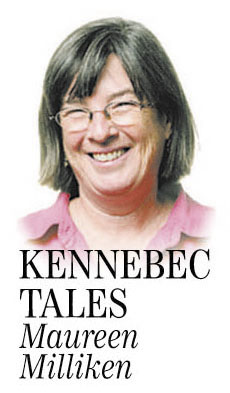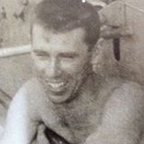It was a classic rookie journalism mistake. Seemed like a good idea at the time, but it wasn’t. Not even close.
The staff of Cony High School’s newspaper, The Ramses, needed a filler and needed it fast. The name of the newspaper was the same as the name of a contraceptive cream. Someone had the bright idea to put a picture in the paper of a tube of the cream with the words “Don’t forget to buy your Ramses.”
I was a co-editor of the paper then, in 1979, and, no, it wasn’t my idea. But I thought it was just dandy.
When the paper came out with the ad in it, our advisor, Thomas Sturtevant, wasn’t amused.
It’s the only time I can remember him raising his voice at us. Up until then, the advisor-editor relationship had been pretty laissez-faire, so his anger came as a shock.
My regret and embarrassment at what in the cold fluorescent light of day was a really stupid editing decision were compounded by the fact that we’d made this kind, mild-mannered man angry.
It hadn’t occurred to me that the nice guy with a bent toward peace activism could get angry, and it puzzled me.
Around the same time, in another classroom, one of my classmates had asked a teacher what she and her colleagues said about us in the teacher’s lounge.
Pinning him with her trademark laser glare, she said, “Don’t you think we have better things to talk about than you?”
Did they? What could they possibly be talking about?
In the self-absorbed world of the high school teenager, where teachers may have first names but 35 years later we still think of that first name as Mr. or Mrs., where they exist only for our pleasure or derision, it was hard to imagine that they had a life. Teenagers do think rationally, but most of their brain isn’t used for that, so grasping that a teacher has a life and making it part of daily reality are two different things. That teenage image lives on when the teacher character created then lives on in the old scenes in the brain. We never knew them as people, so the characters stay the reality.
And so it was with fascination I read this week that Thomas Sturtevant was a charter member of Veterans for Peace.
That, as his obituary in January 2012 said, he immersed himself in organizations that “focused on the promotion of peace and pointing out the wastefulness and travesties of war.”
In high school, we knew he had anti-war views. Vietnam was still close enough to be an open wound and it seemed as though people felt a lot more strongly about peace and war than they do now, even though we’ve been at war for more than a decade.
Self-absorbed as we were, though, our own views may have been important, but a teacher’s views were something to joke about, not think about.
Sturtevant was described in a Kennebec Journal story this week as a hero for peace. A group in Winthrop, where he’d lived for decades, dedicated a peace pole and bench to his memory.
“Tom was a homemaker and a peacemaker who was not a pie-in-the-sky mystic,” said Doug Rawlings, of Veterans for Peace, on Sunday. “He was a fiercely moral man.”
His son, Ben Sturtevant, said the roots of his father’s peace activism were deep. When Tom Sturtevant was a young teen, his older brother died in World War II.
“He was very affected by that, throughout his life,” Ben said this week. Still, Tom Sturtevant joined the Navy, partly to pay for school, and partly, his son said, to follow in his brother’s footsteps.
His letters show that he was gung-ho during his first training years, but once he got to Korea, where his ship supported planes during the war, his attitude began to change.
He told his son that when they were loading up bombs, the servicemen would write messages on them to the Koreans the bombs would fall on.
“I don’t have anything against these guys,” Tom Sturtevant began to think.
“He began to question why we were involved,” Ben said. After Sturtevant returned home, he read up on the war and his anger grew “and that’s where his activism began.”
“I remember when I was a little kid and we’d watch the news on TV during the Vietnam war and the casualty reports would come on and he’d get so angry,” Ben said. “I’d be like, ‘Why’s he so angry?’ I didn’t get it.”
As a young teacher at Cony, he encouraged students to protest the war, something Sturtevant’s one-time students still mention to Ben, he said.
When Ben was a student at Winthrop High School, he’d argue with his father about the war and his peace activism.
“High school students don’t want to be different. I didn’t want to be different from my friends,” Ben said. “But in my heart, I knew he was right.”
His father was different but didn’t care. “He definitely didn’t follow the crowd,” Ben said.
Being for peace is still a squishy stance, especially for men.
Politicians who dare push for it, such as former U.S. Rep. Dennis Kucinich, an Ohio Democrat, are ridiculed and belittled. Department of Peace? Who ever heard of such a ridiculous thing?
Tom Sturtevant was a fan of Kucinich, and the drum used at Sunday’s ceremony was signed by him.
Sturtevant was called a hero Sunday, and he was one in the true sense of the word.
“He’d get frustrated, but he’d never give up,” Ben said. “He was convinced he could change people’s minds, and I think he might have.”
The peace pole that was dedicated Sunday in Winthrop is a great tribute to him.
A better one would be that we all stop being self-absorbed high schoolers, ready to dismiss and smirk at an idea that upsets our world view, and really think about what the man had to say.
Maureen Milliken is news editor of the Kennebec Journal and Morning Sentinel. Email her at mmilliken@centralmaine.com. Kennebec Tales is published the first and third Thursday of the month.
Send questions/comments to the editors.




Success. Please wait for the page to reload. If the page does not reload within 5 seconds, please refresh the page.
Enter your email and password to access comments.
Hi, to comment on stories you must . This profile is in addition to your subscription and website login.
Already have a commenting profile? .
Invalid username/password.
Please check your email to confirm and complete your registration.
Only subscribers are eligible to post comments. Please subscribe or login first for digital access. Here’s why.
Use the form below to reset your password. When you've submitted your account email, we will send an email with a reset code.